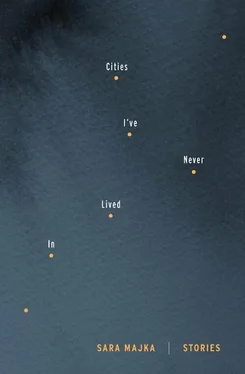Her office was on the second floor of the building. She was, on the day I first went up, tucked into her desk. She looked up when I came to the door. I introduced myself. Yes, I’ve seen you on Sundays, she said. You live in back. With my husband, I said. Yes, and your little girl, she said. No, I said quickly. We don’t have a child. We would like to, but it will be some time … I paused and she didn’t speak, though it had been her mistake. She was waiting for me to explain myself. Perhaps those of faith are used to being told — if they sit still and wait — are used to being told everything. I don’t have a girl, you see, I said. Though I would like one. We’re young still, I said. Too young to take in a child, I thought, imagining them as souls in a hall, waiting for someone to open the door so they could pass through, and that parents were nothing more than that, not the thing itself, not the moment of their creation. I felt that the girl had returned to the hallway to wait again.
The pastor grew up in a town in New Hampshire. Ellsworth, she said, then asked if I knew it. She took out a large green book. I waited for a theology lesson but in fact she was opening an atlas. She pointed to a dot in the middle of New Hampshire. Her mother had died and her father was an alcoholic, she said. The town had one church in the middle of a field. She never went as her father wasn’t religious. It held her more, she said, than had he had religion and she had gone every week. She hadn’t returned to Ellsworth in twenty years, she said, and still had never gone to the church. Though she called our time together her visiting hours and made clear it was part of her work as pastor — to attend to the spiritual needs of the community — she mostly talked about herself and her beliefs, and not in the sense that she was teaching me, but because she seemed to enjoy talking out loud. Perhaps she hadn’t been given such free range in a long time.
I could see the New England in her. You could see her in a turtleneck with her face whitened with the cold. She had asked me about my childhood, and I talked about my parents. My mother was strict, I said. It was a stern upbringing, a New England upbringing. And she said, Yes, as was mine. She said her childhood would have been lonely if not for her faith, which she had from a young age. I asked her what faith felt like, what it felt like in your body, whether it had a physical sensation such as longing had. I wouldn’t know, she said.
Once I felt the desire to have a baby it took me a year to realize what it was; something clinched me in a tight place in my chest and pulled me, but I didn’t know what the pulling was. It wasn’t what I would have guessed. That you feel the urge to have a baby and a worry that you won’t be able to have a baby. Instead it feels like you’ll expire; there’s a sense of time running out. An urgency as if you’ll die soon. I hadn’t imagined that about the desire, how physical it would be. She leaned back in her chair, as if to consider, and said, I haven’t felt those things. I don’t know.
I was traveling once — where was I? — I was in Columbus, I think, and I came upon a historical street sign. One of those that describe a landmark. This one said Strangers Church and explained that there had been several churches that served the area hotels. I remembered it because, well, weren’t they all strangers’ churches? Hers had been. She was not fit for the work. The congregation didn’t warm to her. She left a year or two after we left. She had a poor memory and poor facial recognition in a job where you needed both. When I had once asked her, Why did you think I had a little girl that one time? she had said that with such a changing parish, it’s hard to remember most people. She usually didn’t do what she had done that day — give her lack of memory away — but she had forgotten herself for a moment. It was a good guess, so many children in the congregation. You know, she said, often parents come because they want their children to grow up around faith, not because they have faith themselves. Which is not the same, she said. Not the same at all.
On the second service of the day, the deacon read to the children. The children came up and she would motion for them to sit around her. Then she would read a story that, in my memory, always involved lambs and the goodness of Jesus. She was jolly and happy and made the children comfortable. Where was the pastor during this time? Sitting back, watching.
I tried my best with my therapist to remember what had taken place in the Church Apartments. Our living room that didn’t have any furniture. The services I went to sometimes, mostly alone, because neither of us had religion but I liked the quiet hall and the pews that were engraved with names of deceased relatives. My nocturnal habits. The long hallways. The room with the children, and the parents standing outside, waiting to take the children away. What did Richard do during this time? she asked, pointing out that when I told stories, he wasn’t there. You must have been lonely, she said. But he was at work; the silence and hard work no doubt helped him as the hallways helped me. We are all lost. Why blame him? It was silly to remember the stories of us not getting along. The melodrama of any couple breaking apart. My feelings for the man who stayed for a month in the neighboring apartment who made jewelry. He lay earrings on the bedspread and let me pick a pair. Feathers I picked and even wore. Mistaking the relief from loneliness that meeting another fragile soul can bring about, mistaking that for love, but who’s to say it wasn’t love, or what I felt for Richard, that it was love. Who’s to say.
Before my husband and I left Portland, I went to say good-bye to the pastor. She was tired that day and struggling to write the sermon. She said that sometimes it came and she could feel the words inside her. But lately, she said, it had become harder for her. It felt as if words were not inside her. I wondered if that meant the faith was also not there, but didn’t ask. She had told me she never doubted her faith, that there could be no crisis of faith, that it would feel like not being alive. She sometimes thought that she wasn’t a good pastor. That the faith in her was a private thing and sometimes she didn’t want to talk about it, though sometimes she did.
When I learned that she had left the church, left the faith, and gone back to New Hampshire, I imagined her at the grocery store. Examining the range of fruit in confusion — the watermelon, so alien to the climate, holding it and then having no one to tell about it later. To sit at home at her table by the window. Perhaps the most important thing is to have someone to tell things to. But no, she had faith, she would have felt herself in conversation all the time. Sometimes I thought that maybe I had faith and simply didn’t identify that when I talked in my mind — and I talked all the time — that I hadn’t identified who I was talking to, not allowed myself to feel the presence there. I had considered this one day when I was walking in the new city I had moved to. In this city there was an elevated train that I was always catching sight of in the distance. It was, sometimes, when the light was right, a magical place. The elevated train, the distant Amtrak tracks, all the children, who, in my imagination, were also in elevated places, as if there were elevated playgrounds, too. I walked and thought, Maybe I should have a child. Or maybe all this, this is always a response, only I’m not hearing it properly.
There is one last story that I have been trying to tell: what happened to the man who ran away from his kids on the island. When I told my mother the story, she said that the way it was left led her to believe he had killed himself. My mother rarely lets on that she is curious about what is around her — curious about anything abstract, not immediately a part of her day — but sometimes she would show that she knew quite well what was around her. She would reveal it as matter-of-factly as she revealed anything else, such as what was going on at her friend’s or the neighbor’s.
Читать дальше












